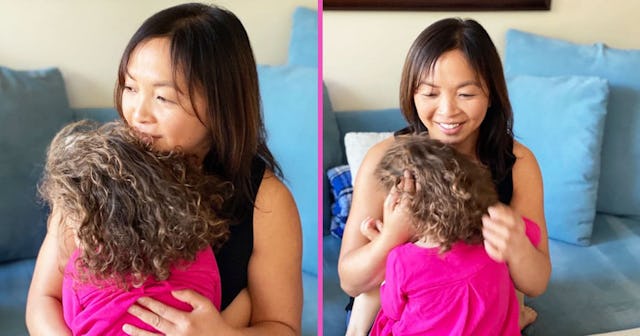I'm Sick Of Being Mistaken For My Biracial Children's Nanny

My daughter’s hair cascades below her shoulders in an ocean of curls. I like to rake my fingers through it to fluff it up into a gravity-defying pompadour. It is a mild obsession, mostly, because it is so different from my stick straight hair.
To draw her own self-portrait, she always uses the Burnt Sienna crayon to make curlicues around a stick figure face. Then she pulls out a black crayon to draw my hair.
RELATED: How To Get Crayon Off Walls And A Bunch Of Other Stuff — Because, Kids
There are a lot of similarities between my daughter and me. At four, she likes to correct my grammar. When the house falls quiet, I always find her in the corner of a room, face buried in a Dr. Seuss book.
But what the world always sees first are our differences. I am Chinese. Brown eyes, round face, straight black hair — not unlike her drawings of me. Her fair complexion, hazel color eyes and curly hair draws quizzical looks from strangers.
People always look at her first because she is a magnet for attention, then their gazes fall on me silently trying to figure out how we fit together. The lingering eyes often lead to compliments about her hair and then all too often comes the question, “Are you the mother?”
Maybe this is the burden of having biracial children — your family’s physical differences justifies the right for strangers to question your belonging.
It can drive a mama fucking mad.
Do you know what it’s like to always be questioned about your belonging?
Courtesy of Lynda Lin Grigsby
My husband is of Nordic pedigree. Cornflower blue eyes, square jaw and wavy hair the color of harvest-ready wheat. When we decided to have kids, I felt a need to issue a disclaimer: our children will mostly likely look more Asian than Caucasian. There is no scientific data, just aggregate observation from friends and family members who also dipped their toes outside of same-race relationships. I even cited the Public Enemy song, “Fear of a Black Planet,” which extols the superiority of minority genes.
“It doesn’t matter to me, just as long as he or she looks like you,” my husband said, then we melted into each other and he sent his Viking genes to conquer mine.
Our son was born eight years ago with blue eyes and hair the color of wheat. In the corner of the hospital room, with chest full of pride, his dad fist-pumped and blew an imaginary Viking Gjallarhorn of victory. He had won. Public Enemy was wrong.
The questions began almost immediately, and it always started with a compliment. In line at the grocery check-out counter, strangers would coo at my Nordic baby, then ask me if I was the nanny. A well-heeled mother at the park watched me interact with my son, praised my attentiveness and then asked for my daily rate. Thoroughly disoriented, I told her I was not a prostitute, because that was more logical to me then doubting my parentage.
Do you know what it’s like to always be questioned about your belonging? I can tell you from experience, it makes you feel small, less than. Because even though our kids’ classmates are from increasingly diverse background, the collective idea of family is still a Norman Rockwell portrait of sameness. When a family like mine doesn’t fit the mold, it doesn’t give you the right to ask why, even if you qualify it first with a compliment.
At first, I would answer the questions about my biracial kids sheepishly, “Yes, his father is white. I don’t know why he doesn’t look like me.”
By the time my daughter arrived, I couldn’t give two shits.
Courtesy of Lynda Lin Grigsby
My daughter’s curly hair required time and a lot of YouTube tutorial videos to develop a maintenance routine. In the beginning, I would shampoo her hair every night and comb it in the morning — when it was dry. This resulted in a beautiful, tumbleweed bouffant on top of my baby’s head.
So let’s take a minute to go over the family picture again: There’s me, Chinese with the round face; my Nordic husband and son; and our baby girl with dandelion-shaped hair. Norman Rockwell painting, we are not.
The comments and questions about my role in the family came almost daily, but with more experience, my responses were at the ready.
Yes, these are my children. I grew them. I was there when they came screaming out of my body. I have witnesses. Yes, I know they don’t look like me.
When I feel magnanimous, I explain my ancestors’ country of origin. I talk about my husband’s, then I wriggle my fingers together and point at my kids like the end of magic trick. It’s my way of trying to nudge some room into a person’s idea of what a family should look like.
Other times, I say, “So what? Why do you ask?” Because what is the intent of pointing out differences except to possibly make someone feel little or left-out?
Sometimes, the comments are innocent — little, golden conversation-starters between strangers. In those times, I keep it short and honest.
We are a family.
We may not look the same, but we love. And the next time you see a family whose members have different skin color, hair texture or eye shapes, instead of wondering how they fit together it might be better to just admire how they are together.
As the mother of biracial kids, I would love to hear that we are a beautiful family, picture-perfect in every way.
This article was originally published on